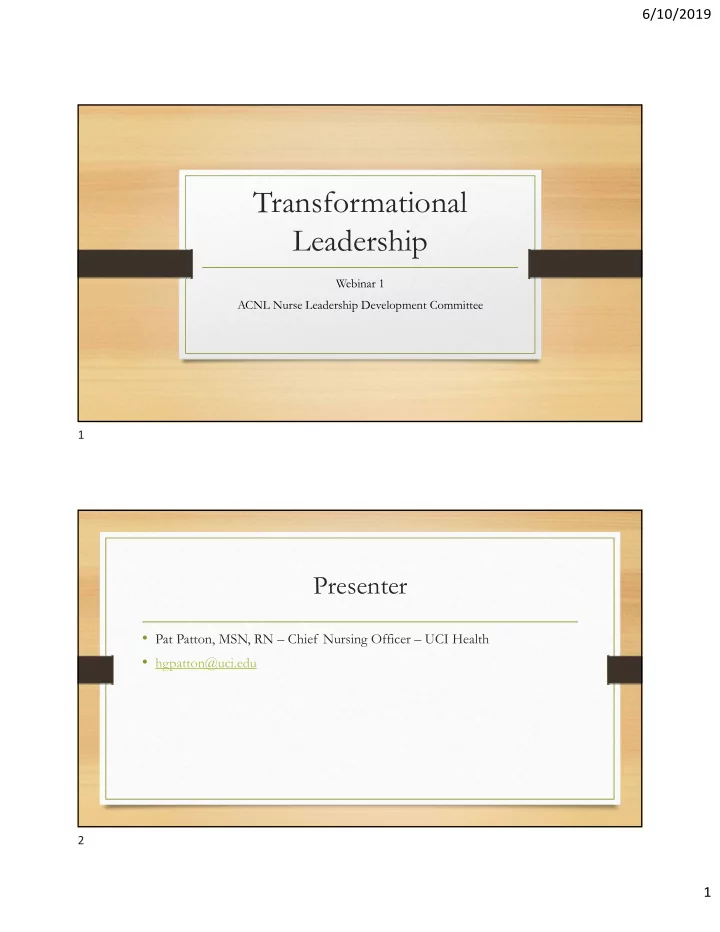

6/10/2019 Transformational Leadership Webinar 1 ACNL Nurse Leadership Development Committee 1 Presenter • Pat Patton, MSN, RN – Chief Nursing Officer – UCI Health • hgpatton@uci.edu 2 1
6/10/2019 Purpose • Welcome • 4 part series • Transformational Leadership series • We will walk you through the tenets of Transformational Leadership • Case studies, articles, take-aways 3 Objectives • After this webinar, the learner will be able to: • Understand and explain Leader Development Readiness • Differentiate transformational leadership from transactional leadership • Distinguish the different leadership styles and when each can be used effectively 4 2
6/10/2019 Transformational Leadership A Transformational Leadership Webinar “No person ever steps in the same river twice, for it’s not the same river and she/he is not the same person.” Heraclitus of Ephesus (535 – 475 BCE) 5 Leader Development Readiness n. The ability and motivation to focus on, make meaning of and develop new and more complex ways of thinking that positions you more effectively to assume leadership roles. 6 3
6/10/2019 Building Blocks • Leader Development Readiness • Motivation to Develop • Motivation to Lead • Motivation to Learn • Goal orientation • Leader Confidence 7 Building Blocks • Leader Development Readiness • Ability to Develop • Awareness of strengths and weaknesses • Awareness of thinking • Suspending judgment • Emotional regulation 8 4
6/10/2019 Motivation to Develop - Fundamentals • Motivation to Lead • Willingness to step into the role • Aspiration • Role models make a difference • Increases with trial and success/failures • Motivation to Learn ( specific to leadership ) • Source of the Drive to Develop Internal > External • Fixed versus Incrementalist • Value of leadership 9 Motivation to Develop – What governs us • Leadership Self-Confidence • Motivational mitigators • Actions – Do I know what to do? • Means – Do I have the means (resources, support) to do it? • Self Motivation: Can I make myself do it? • All 3 are needed to turn aspiration into actions • Goal Orientation • Direction of Motivation: Learning > Performance • Allows you to stretch • Orthogonal (on different axes – not different ends of a scale) 10 5
6/10/2019 Ability to Develop - Awareness • Awareness of Thinking and Learning • Leadership as cognition • Ownership /Control of ones thinking and learning • Managing thinking and learning through new techniques • Awareness of Strengths/Weaknesses • Humility vs. Hubris • Realistic Sense of Self 11 Ability to Develop - Control • Emotional Regulation • Managing feelings • Thinking about feelings • Also built through feedback and reflection • Perspective Taking • Allows you to suspend judgment 12 6
6/10/2019 In addition to your own readiness, think about others you support • Their willingness • Their abilities • High/Medium/Low – How are they doing? 13 Interactive exercise • Identify a time when you have been asked to take on a leadership role: • Felt reluctant • Felt excited 14 7
6/10/2019 Exercise continued • Identify a situation when you were in a leadership role and • Felt successful • Learned something 15 Traditional Leadership Styles • Democratic Leadership. Commonly effective… • Autocratic Leadership. Rarely effective… • Laissez-Faire Leadership. Sometimes Effective… • Strategic Leadership. Commonly Effective… • Transformational Leadership. Sometimes Effective… • Transactional Leadership. Sometimes Effective… • Bureaucratic Leadership. 16 8
6/10/2019 Leadership Framework 17 Leadership Styles • Passive Avoidant • Management by Exception Passive • Management by Exception Active • Transactional Leadership • Transformational Leadership 18 9
6/10/2019 Passive Avoidant • Non transacting • “I don’t care if you do or don’t” • General Characteristics • Delays, Absent, Indifferent • Actions • Avoids taking a stand on issues • Doesn’t emphasize results • Refrains from intervening ( totally conflict avoidant) 19 Management by Exception Passive • Corrective Transaction • “If I happen to see that you didn’t…” • General Characteristics • Wide acceptance range • Ineffective monitoring • Actions • Sets standards but waits for deviations • Waits for problems to arise • Reacts to mistakes 20 10
6/10/2019 Management by Exception Active • Corrective Transaction • “I am watching to see that you don’t…” • General Characteristics • Selective attention to deviations • Corrects problems when detected • Actions • Monitors for deviations to occur, then corrects • Searches for errors, then corrects • Enforces rules 21 Transactional Leadership • Constructive Transaction • “If you do as we agreed…” • General Characteristics • Clarifies desired outcomes • Exchanges rewards and recognition for accomplishments • Actions • Actively monitors to provide supportive feedback • Provides recognition for accomplishments 22 11
6/10/2019 Transformational Leadership • Transacting • “I identify follower needs and work to elevate them” • General Characteristics • Empathetic • Valuing of individual needs and strengths • Encouraging continuous improvement • Actions • Is alert to individual follower’s needs and desires • Provides learning and performance opportunities 23 Transmitting a Full Range Leadership Styles • What does he/she value & believe? (II) • How does she/he energize people? (IM) • How does he/she get you to challenge them? (IS) • How does she/he develop you and others? (IC) • How does he/she clarify expectations? (TA) • How does she/he treat mistakes? (AC) • What does he/she avoid? (PA) 24 12
6/10/2019 Next Webinar topics • Transformational Leadership • Intellectual Stimulation • Inspirational Motivation • Moments that Matter 25 Comments/Questions? 26 13
Recommend
More recommend